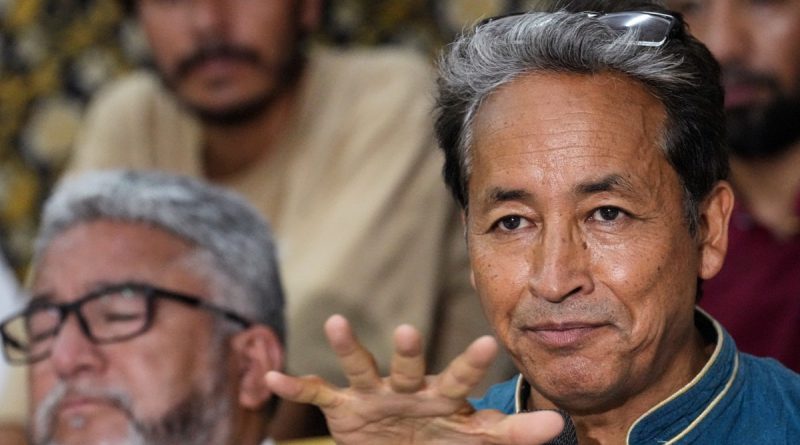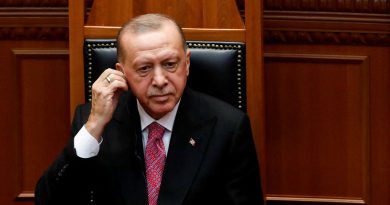OPINION: India, Sonam Wangchuk, and the Risk of an Arab Spring Replay
By invoking Arab Spring rhetoric and courting Pakistani connections, Wangchuk inadvertently echoes a playbook that has devastated entire regions.
Sonam Wangchuk, the Ladakhi educationist and activist once celebrated as the inspiration behind Bollywood’s “3 Idiots,” has lately transformed from a reformist voice into a figure of controversy. Known for founding the Himalayan Institute of Alternatives, Ladakh (HIAL), he became the face of local agitation for statehood and constitutional protections under the Sixth Schedule.
His hunger strike earlier this year won him significant attention but also drew criticism for what the government described as “provocative” remarks.
When addressing young Ladakhis, Wangchuk invoked the imagery of Gen-Z protests and explicitly compared them with the Arab Spring uprisings. The consequences were immediate: four people died and over 80 were injured in violent clashes, exposing how quickly peaceful calls can spiral when rhetoric crosses a line.
For a man under investigation by India’s Central Bureau of Investigation (CBI) for alleged violations of India’s Foreign Contribution (Regulation) Act (FCRA) and questionable foreign links—including a controversial trip to Pakistan on February 6 this year—the comparison to the Arab Spring raises troubling questions.
Why Invoke the Arab Spring?
The Arab Spring has become a cautionary tale. Initially romanticized as a youth-driven democratic wave, it was later revealed to have been supported—if not orchestrated—by a complex network of foreign funding, non-governmental organizations, and the American Deep State. What began in Tunisia spread like wildfire across Egypt, Libya, Syria, and Yemen, toppling regimes but leaving behind smoldering wreckage.
The Middle East paid the heaviest price: once-stable nations descended into civil war, terrorism flourished, and millions were displaced. A decade later, Libya remains fragmented, Syria devastated, Yemen on the brink of collapse, and Egypt still grappling with the aftermath of political upheaval.
For Arab societies, the term “Arab Spring” is no longer synonymous with reform—it is shorthand for chaos, foreign meddling, and broken states.
It is against this backdrop that Wangchuk’s casual invocation of the Arab Spring appears not just reckless but deeply revealing. Why would an Indian activist, championing local grievances, align his rhetoric with one of the most foreign-manipulated regime change projects in modern history?
The Pakistan Connection and Exploitation of Influencers
Equally significant is the timing of Wangchuk’s visit to Pakistan on February 6, 2025. Islamabad has long used the cover of cultural exchange, intellectual dialogue, and activism to infiltrate Indian discourse.
Pakistan’s intelligence playbook thrives on cultivating influencers—artists, reformists, journalists, and social media personalities—who can shape narratives at home and abroad.
The method is subtle but consistent: present Pakistan as a victim of geopolitics, project grievances against India, and amplify dissenting voices within Indian society. From Bollywood exchanges in earlier decades to digital influencers today, Pakistan has perfected the art of weaponizing “soft” platforms for hard outcomes.
Take, for instance, Indian influencer Jyoti Malhotra, who has come under scrutiny for her connections with Pakistan-linked forums. Malhotra’s participation in dialogues hosted by organizations with shadowy funding raised eyebrows in New Delhi, reinforcing how cross-border platforms can be misused to normalize Pakistani positions.
Wangchuk’s visit, therefore, cannot be seen in isolation—it fits a troubling pattern of Indian intellectuals being courted, celebrated, and occasionally manipulated across the border.
Honey Traps, Cultural Fronts, and the Old Game of Taqiyyah
Pakistan’s tactics are not confined to polite cultural dialogues. Honey trapping—luring targets into compromising situations—has been a frequent tool of its intelligence services, ensnaring not only soldiers but also politicians and journalists. The aim is simple: extract information, secure leverage, and influence narratives.
Beyond espionage, Pakistan routinely uses the language of arts, reforms, activism, and cultural exchange as a facade. NGOs, student forums, and peace-building seminars are often the velvet glove over the iron fist of propaganda. By elevating select Indian voices who echo their lines, Pakistani handlers create echo chambers that undermine India from within.
This duplicity is best understood through the Shiite concept of Taqiyyah—a doctrine allowing concealment of true intent under threat. While theologically nuanced, Pakistan’s statecraft has weaponized it in the crudest form: presenting a peaceful, reformist face abroad while quietly sponsoring militancy, terrorism, and subversion at home.
For decades, Islamabad has perfected this Janus-faced approach—smiling in dialogue while plotting in deception. Wangchuk’s entanglement, whether naïve or deliberate, risks making him another pawn in this strategy.
Lessons from the Region: A Warning to India and the World
The Wangchuk episode must not be viewed in isolation but against the broader regional backdrop. South Asia has already witnessed a series of regime-change operations influenced by external forces.
In Bangladesh, foreign-backed campaigns have repeatedly destabilized governments, while in Nepal, Gen-Z protests often reflected wider geopolitical contestations.
Sri Lanka’s economic collapse triggered protests that bore unmistakable signs of external manipulation, and in Pakistan, the cycle of elite capture and engineered street movements has become a recurring pattern.
Now, whispers of a similar attempt in India cannot be dismissed lightly. By invoking Arab Spring rhetoric and courting Pakistani connections, Wangchuk inadvertently echoes a playbook that has devastated entire regions.
For Generation Z and Millennials in India, the message must be clear: protest is a democratic right, but it must be indigenous, accountable, and free from foreign agendas. Imported slogans, borrowed narratives, and externally funded movements rarely serve the people—they serve the puppeteers.
For the international community, particularly in the West, it is time to acknowledge the scars of the Arab Spring and resist the temptation of engineering similar experiments elsewhere. Stability, not chaos, should be the benchmark of global engagement.
Sonam Wangchuk’s journey from an educational reformer to a controversial agitator illustrates the thin line between activism and manipulation. By evoking the Arab Spring, traveling to Pakistan, and operating under the shadow of foreign funding, he has raised questions that go far beyond Ladakh’s statehood.
Disclaimer: Views expressed by writers in this section are their own and do not reflect Milli Chronicle’s point-of-view.



